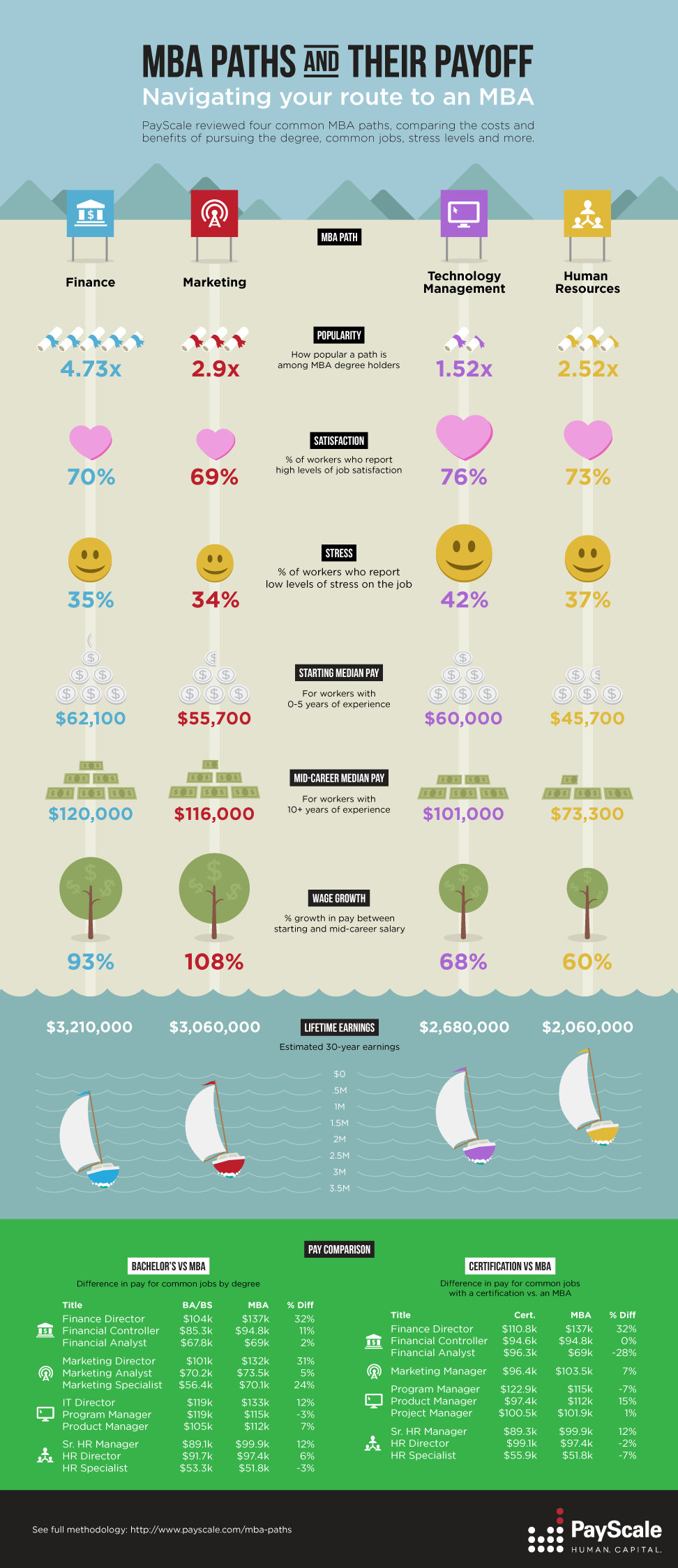Deciding what to do after earning your Masters in Business Administration degree can be daunting, as there are a plethora of career paths available. The skills you acquire during your MBA program, such as analytical thinking, problem-solving, and leadership, open doors to diverse industries and roles. Whether you aspire to climb the corporate ladder, become an entrepreneur, or pursue a specialized field, your MBA empowers you to unlock your full potential. In this article, we will delve into the various common career paths after earning an MBA, exploring the opportunities and challenges associated with each to help you make an informed decision about your future endeavors.
What Are the Common Career Paths After Earning an MBA?
Management and Leadership Roles
An MBA equips graduates with the necessary skills and knowledge to excel in managerial and leadership positions across various industries. Here are some common career paths:
General Management: Graduates can take on roles such as CEO, COO, CFO, and CIO, leading and managing entire organizations or divisions.
Marketing Management: MBAs with a focus on marketing can pursue roles like Marketing Director, Brand Manager, and Digital Marketing Manager.
Sales Management: Graduates can excel in sales leadership positions like Sales Director, Sales Manager, and Account Executive.
Human Resources Management: MBAs with expertise in human resources can take on roles like HR Director, Compensation & Benefits Manager, and Talent Acquisition Manager.
| Role | Key Responsibilities |
|---|---|
| General Manager | Leading and managing the overall operations of a business or division. |
| Marketing Director | Developing and implementing marketing strategies to achieve business objectives. |
| Sales Director | Leading and motivating sales teams to meet sales targets. |
| HR Director | Developing and implementing HR strategies to attract, retain, and develop talent. |
Entrepreneurship and Startups
An MBA provides the foundation for entrepreneurship, enabling graduates to launch their own businesses.
Business Owners: MBAs often start their own ventures, taking advantage of their business acumen and network to build successful businesses.
Startup Founders: Graduates can join or lead startups, leveraging their skills in business strategy, finance, and operations.
| Role | Key Responsibilities |
|---|---|
| Business Owner | Managing all aspects of a business, from strategy to operations. |
| Startup Founder | Leading a team to develop and launch a new product or service. |
Consulting
MBAs are highly sought after in the consulting industry, where they can apply their analytical and problem-solving skills.
Management Consulting: Graduates can work for consulting firms, advising clients on business strategy, operations, and organizational change.
Strategy Consulting: MBAs with a strong analytical background can focus on strategy consulting, helping organizations develop and implement strategic plans.
Technology Consulting: MBAs with a technical background can specialize in technology consulting, advising clients on IT strategy and implementation.
| Role | Key Responsibilities |
|---|---|
| Management Consultant | Analyzing business problems and developing solutions for clients. |
| Strategy Consultant | Developing and implementing strategic plans for organizations. |
| Technology Consultant | Advising clients on IT strategy and implementation. |
Unlocking Your Potential: Top Career Paths After an MBA
Management and Leadership Roles
An MBA equips graduates with the skills and knowledge needed to excel in management and leadership positions. Common roles include:
General Manager: Oversees all aspects of a company’s operations.
Product Manager: Develops and manages product lifecycles, from conception to launch and beyond.
Operations Manager: Optimizes production processes and efficiency within an organization.
Project Manager: Leads cross-functional teams to deliver projects on time and within budget.
Human Resources Manager: Develops and implements HR strategies, including recruiting, training, and employee relations.
Finance and Accounting
An MBA with a finance specialization can open doors to exciting careers in the financial world:
Financial Analyst: Conducts research and analysis to advise on investments and financial decisions.
Investment Banker: Assists companies with mergers and acquisitions, debt and equity financing, and other financial transactions.
Corporate Finance Manager: Manages the financial health of a company, including budgeting, forecasting, and investment decisions.
Chief Financial Officer (CFO): Oversees all financial operations and reporting for a company.
Risk Manager: Identifies and mitigates financial risks for organizations.
Marketing and Sales
For those with a passion for marketing and sales, an MBA can equip them with the strategic and analytical skills to succeed:
Marketing Manager: Develops and executes marketing campaigns to reach target audiences.
Sales Manager: Leads and motivates sales teams to achieve revenue targets.
Brand Manager: Manages the overall brand identity and image of a company or product.
Digital Marketing Manager: Focuses on online marketing strategies, including SEO, social media, and email marketing.
Product Marketing Manager: Bridges the gap between product development and marketing, ensuring successful product launches.
Consulting
An MBA is a highly sought-after qualification for consulting roles, where graduates use their analytical and problem-solving skills to advise clients:
Management Consultant: Provides strategic advice and solutions to businesses across various industries.
Strategy Consultant: Helps organizations develop long-term growth strategies and improve competitive advantage.
Operations Consultant: Focuses on improving operational efficiency, supply chain management, and process optimization.
Financial Consultant: Provides financial advice to individuals and businesses, including investment planning and wealth management.
Technology Consultant: Advises clients on technology strategy, implementation, and integration.
Entrepreneurship
For those with entrepreneurial aspirations, an MBA can provide the tools and resources needed to launch and grow a successful business:
Startup Founder: Creates and leads a new venture, developing innovative products or services.
Small Business Owner: Manages and operates an independent business, utilizing strong leadership and business acumen.
Social Entrepreneur: Starts businesses with a social mission, addressing important societal issues and creating positive change.
Venture Capitalist: Invests in early-stage startups, providing funding and mentorship to support growth.
Angel Investor: Provides funding and guidance to promising startups, typically as an individual or small group.
Frequent questions
What are the most common career paths after earning an MBA?
An MBA can open doors to a wide range of career paths, but some of the most common include:
Management Consulting: This field involves providing advice to businesses on a variety of issues, such as strategy, operations, and technology. Consultants typically work in teams and have a wide range of skills, including analytical, communication, and problem-solving abilities.
Investment Banking: Investment bankers help companies raise capital, advise on mergers and acquisitions, and trade securities. This field requires strong analytical and financial skills, as well as a deep understanding of the financial markets.
Corporate Finance: Corporate finance professionals manage the finances of a company, including budgeting, forecasting, and capital allocation. They may work in a variety of departments, such as accounting, treasury, or investor relations.
Product Management: Product managers are responsible for the development and launch of new products or services. They work closely with engineering, marketing, and sales teams to ensure that products meet customer needs and are successful in the marketplace.
Entrepreneurship: An MBA can provide the skills and knowledge necessary to launch a successful business. Many MBA graduates go on to start their own companies, often in industries they are passionate about.
Marketing: MBA graduates with a strong interest in marketing can pursue careers in brand management, digital marketing, and market research. They use their analytical and strategic skills to develop and implement marketing campaigns.
Human Resources: MBA graduates with a focus on human resources can find careers in talent acquisition, employee relations, and compensation and benefits. They use their knowledge of business and people to help organizations attract, develop, and retain top talent.
Operations Management: Operations managers are responsible for the efficient and effective operation of a business. They use their analytical and problem-solving skills to improve processes, reduce costs, and increase productivity.
What are the benefits of pursuing an MBA?
Pursuing an MBA can offer several benefits, including:
Increased Earning Potential: Graduates with an MBA often earn significantly higher salaries than those with only a bachelor’s degree. According to a 2022 survey by the Graduate Management Admission Council (GMAC), the average starting salary for MBA graduates in the United States is $115,000.
Career Advancement Opportunities: An MBA can open doors to more senior and leadership roles within an organization. It demonstrates to potential employers that you have the knowledge, skills, and experience to succeed in a management position.
Enhanced Skills and Knowledge: An MBA program provides a rigorous curriculum that covers a wide range of business topics, such as finance, marketing, strategy, and leadership. Graduates gain a deep understanding of how businesses operate and are equipped to solve complex business problems.
Networking Opportunities: MBA programs offer students the chance to connect with other ambitious professionals and build a network of contacts. These connections can be invaluable for career advancement and business opportunities.
Personal and Professional Growth: An MBA program can help you develop your leadership skills, critical thinking abilities, and communication skills. It can also provide you with a new perspective on the world and your own career goals.
How can I choose the right MBA program for my career goals?
Choosing the right MBA program is crucial for achieving your career goals. Here are some factors to consider:
Your Career Goals: Identify the specific career paths you are interested in and research MBA programs that are known for producing graduates in those fields.
Program Curriculum: Make sure the program curriculum aligns with your career aspirations and covers the relevant topics and skills you need to succeed.
Faculty and Research: Look for programs with renowned faculty and a strong research focus in areas that interest you.
Networking Opportunities: Consider the program’s alumni network, career services, and industry connections, as these can be helpful for job searching and networking.
Location and Culture: Think about the location of the program and the school’s culture and values. Choose a program that fits your lifestyle and preferences.
Cost and Funding: Research the program’s tuition fees and available funding options, such as scholarships and financial aid.
What are some tips for finding a job after earning an MBA?
Finding a job after earning an MBA requires preparation, networking, and a strategic approach. Here are some tips:
Start Early: Begin your job search well in advance of graduation. Attend career fairs, network with alumni, and research potential employers.
Network Effectively: Connect with people in your field, including alumni, professors, and industry professionals. Utilize LinkedIn and other professional networking platforms to build relationships.
Tailor Your Resume and Cover Letter: Customize your resume and cover letter to match each specific job application. Highlight your relevant skills, experience, and career goals.
Practice Your Interview Skills: Prepare for interviews by practicing your answers to common interview questions and understanding the company’s culture and values.
Be Persistent and Patient: The job search process can be challenging and time-consuming. Don’t give up easily, and be persistent in your efforts.












